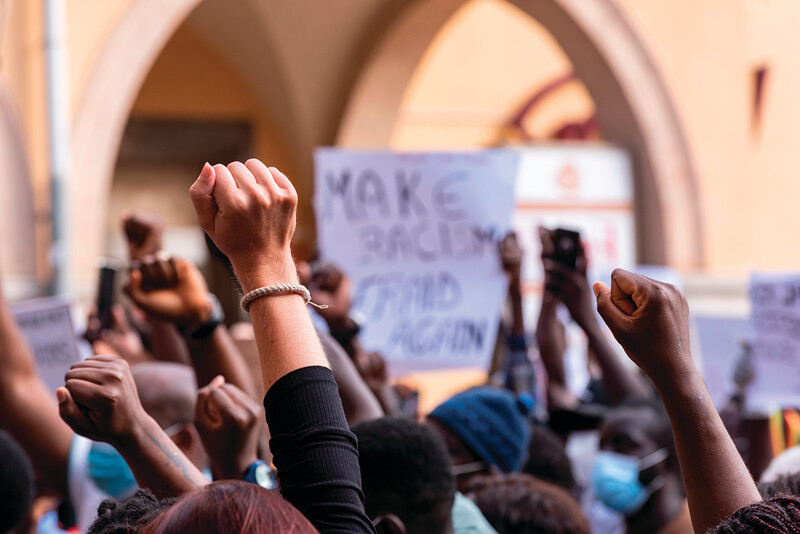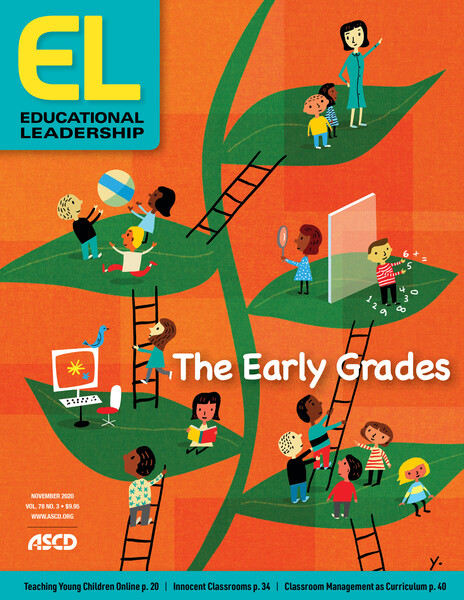November 1, 2020
•
5 min (est.)•
Vol. 78•
No. 3Confronting Inequity / A United Front on Equity
To advance equity work in schools, teachers and school leaders need to have each others’ backs.

When, as children, we wanted something, many of us knew what kind of persuasion our parents were susceptible to. My father, for instance, indulged my habit of debating his logic—to a point, at least. Mom could be softened up for the big ask with a little humor, as long as the joke wasn't mean-spirited or disrespectful. But I learned very young that one tactic was destined to end in absolute failure: saying, "But [insert friend's name]'s parents let them do it!" This was, as the kids say, not "the move." It would lead to immediate and irreversible denial of whatever permission might have otherwise been offered, followed by, "We don't care what your friends' parents let them do. Our house, our rules."
That phrase has been at the top of my mind lately as we educators try to rise to all that 2020 is asking of us. The world wants us to be brave. To use our classrooms to tackle centuries-old inequities, made even more complicated by a once-in-a-lifetime pandemic. In the best instances, we do this work of teaching in ways that advance equity while being supported by the communities we serve.
But for many people, the mere notion that education should destabilize racist, sexist, or homophobic power structures opens us up to accusations—from parents and community members—of "indoctrinating" our students. As I've experienced, such accusations can open up a flood of hate mail, threats, and calls to the administration for the accused teacher(s) to lose their jobs.
It is all well and good to ask teachers to be tough. But to ask us to be fearless in the face of serious pushback or threats is to deny our humanity. We have mortgages to pay, children to feed, debts to pay off. It shouldn't be easy for people in the education space to ask any individual teacher to value promoting transformative (and controversial) discussions among students over continuing their livelihood.
This past summer, many administrators have asked me what they can best do to support their teachers in equity-conscious teaching. There are countless structural adjustments that would help—from reexamining the systems used to keep teachers accountable for lesson planning to retooling our schools' approach to grading. Schools can always get better at professional development. But the most powerful support might also be the simplest: Tell the community that when it comes to equity and justice, "Our house, our rules."
Supportive administrators must say publicly, "In this house, Black Lives Matter. In this house, all genders are equal, and love is love. In this house, we value kindness, and fairness, and we use education to push this country closer to Martin Luther King, Jr.'s challenge to, ‘live out the true meaning of its creed, that all men are created equal.’ Let there be no confusion. This is where we stand."
Such public declarations are easy to lampoon. The cynical among us, especially in this social media age, might say, "This is all talk. Where's the action?" In some cases, cynicism is warranted, but in many others, it misses the point. When this kind of language appears clearly in mission statements, in public speeches from superintendents, and in communications the school sends home, it's that much harder for anyone connected to the school to accuse teachers of going rogue when they teach a more culturally representative text or have a tough discussion in health class.
It's powerful for a teacher to be able to justify her lessons using the school's language, to tell parents how a unit is not only topically aligned with Common Core, but also thematically aligned with the school's publicly available, equity-focused mission statement. This still requires bravery, but no longer begs for martyrdom.
It's equally important that we teachers, once backed up by an indisputable show of public support, never blindside our administrators. We must do our best to let our bosses know when we're going to teach a unit that the community might find controversial. This "heads-up" doesn't just give administrators time to prepare to defend our pedagogy, it can also help mitigate any problems likely to arise with a unit, lesson, discussion, or project we've designed in a way that might be unnecessarily problematic. Sometimes, we teachers fall in love with our own equity-driven plans and make mistakes that administrators find, rightfully, hard to defend. We must be at our most discerning, slow to get our blood up, when receiving feedback on plans for equity-focused instruction.
And sometimes the administrator's answer will be, No, it's not OK to teach that controversial topic in the manner you propose. In such cases, we will have to rethink our plans and come back to our bosses with a sounder approach to teaching a tough topic. At some point, we have to trust their expertise, as long as we're given reasons to do so.
Finally, if as an administrator you do not feel like you can commit to supporting your teachers in equity pedagogy, please say so. It's only fair. We need to know where the lines are, whether we will be isolated when a well-connected parent complains at a school board meeting or a group of Twitter trolls convinces the media to run a story about the "indoctrination" going on in our classroom.
If we know where the lines are, we can either respect them or go teach elsewhere. But we will finally know the rules of the house—as all stakeholders should.
Editor's note: A version of this column was previously published on the ASCD Blog.






